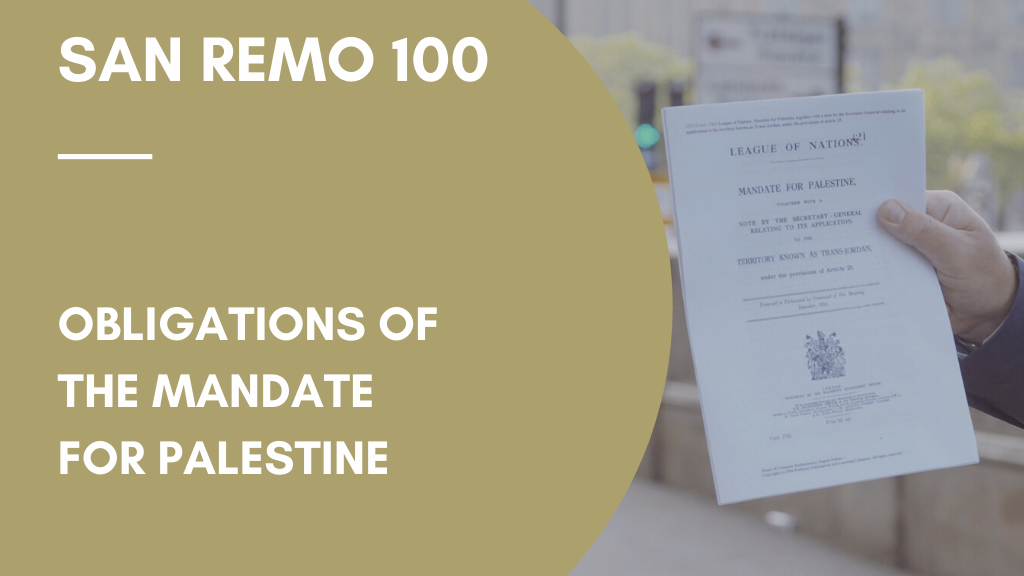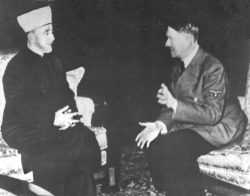Obligations of the Mandate for Palestine – San Remo 100 (part 4)
The San Remo Resolution of 25th April 1920 gave Great Britain the responsibility for executing the Mandate for Palestine, and also for Mesopotamia (now Iraq). France was given the responsibility for the Mandate for Syria, which was later to be split into Syria and Lebanon. The San Remo Resolution was subsequently unanimously endorsed by all founding members of the League of Nations.
‘A Sacred Trust of Civilisation’
The Mandatory Powers had a legally binding obligation to fulfil the terms of their Mandates on behalf of the League of Nations. Article 22 of the Covenant of League of Nations refers to the Mandates as a ‘sacred trust of civilisation’. International Lawyer, Dr Cynthia Day Wallace explains: “A ‘Sacred Trust of Civilisation’ means in this case one country being entrusted with the administration of a nation that is not yet ready for self-government. It is ‘a sacred trust’, not just for that one nation, but a sacred trust of all civilisation – meaning entrusted on behalf of the League of Nations, and all of humanity.” 1
As already mentioned, the Mandate for Palestine was unique in that the beneficiary of this Mandate were the Jewish people, most of whom were living outside the country. Not only was it a ‘sacred trust of civilisation’, but it was ‘a sacred trust’ bestowed upon Great Britain by the God of Abraham, Isaac and Jacob to restore the Jewish people to their Promised Land as foretold in the Hebrew Scriptures. Many Christians living Britain at that time realised this truth, as did many of the Jewish people themselves: ‘He remembers His covenant forever, the word which He commanded, for a thousand generations, the covenant which He made with Abraham, and His oath to Isaac, and He confirmed it to Jacob for a statute, to Israel as an everlasting covenant, saying: “To you I will give the land of Canaan, as the allotment of your inheritance.”’ (Psalm 105:8-11) and “For I will take you from among the nations, gather you out of all countries and bring you into your own land.” (Ezekiel 36:24). These are just two of literally dozens of Scripture passages that speak of Israel’s ownership and restoration to the territory then known as Palestine – referred to in the Bible as ‘the Land of Israel.’
“Not only was the Mandate a ‘sacred trust of civilisation’, but it was ‘a sacred trust’ bestowed upon Great Britain by the God of Abraham, Isaac and Jacob.”
Key Terms of the Mandate
So, what did the Mandate for Palestine obligate Great Britain, as Mandatory, to undertake? First of all, the pre-amble to the Mandate incorporated the wording of the Balfour Declaration. Another foundational clause in the pre-amble states:‘Whereas recognition has thereby been given to the historical connection of the Jewish people with Palestine and to the grounds for reconstituting their National Home in that country.’ 2 The word ‘re-constitute’ here is crucial. The Jewish people are not being given a new right, but a pre-existing right is being recognised, and it applied to all of the territory then known as Palestine. Later, in 1921, the territory east of the Jordan River was excluded from Jewish settlement.
Secondly, in the main body of the Mandate document, Article 2 stated: “the Mandatory (Great Britain) shall be responsible for placing the country under such political, administrative and economic conditions as will secure the establishment of the Jewish national home, as laid down in the preamble …” 3
Article 4 describes the obligation of the Administration to work with a Jewish agency (the Zionist Organisation is mentioned) “in such economic, social and other matters as may affect the establishment of the Jewish national home and the interests of the Jewish population in Palestine …”. 4 Nowhere in the Mandate for Palestine treaty document were the Arabs specifically mentioned. What is expressed several times in the Mandate for Palestine (which is a legal document), and indeed the San Remo Resolution and the Balfour Declaration that preceded it, was “nothing should be done which might prejudice the civil and religious rights of the existing non-Jewish communities in Palestine, or the rights and political status enjoyed by Jews in any other country.” 5
A Subordinate Provision
Legal expert Dr Gerald Adler understands this wording to mean: “When a document says “without prejudice” to ‘this, that or the other’ – it is very clear that that is a subordinate provision. When you have a subordinate clause like that it clearly indicates that there is a main clause, a main objective, a main policy which is restricted in some fashion, but there is no equality between the two provisions.” 6
Following, the Arab massacres of 1929, in which 139 Jews were murdered, the British Commission reports indicated they were to no longer favour Jewish political rights, but that the Arab political interests had to be promoted alongside the Jewish interests.
Dr Adler believes that such a concession was inconsistent with the terms of the Mandate: “When we have a look at ‘nothing shall be done which might prejudice’ – it says ‘the civil and religious rights’. It does not say ‘political rights’. It says “civil and religious rights of the existing non-Jewish communities.” Dr Adler also believes that there was a time limit to this subordinate clause: “the phrase says ‘the civil and religious rights of the existing non-Jewish communities.’ Now it doesn’t mention the future communities. In other words, we’re talking about the existing population as of 1922. Now, the fact that Britain failed to regulate Arab migration after 1922 certainly places the Jews in an invidious position.”7
“Following, the Arab massacres of 1929, in which 139 Jews were murdered, the British Commission reports indicated they were to no longer favour Jewish political rights.”
The Real Purpose of the Mandate
Article 6 of the Mandate obligates Britain to “facilitate Jewish immigration under suitable conditions and shall encourage, in co-operation with the Jewish agency referred to in Article 4, close settlement by Jews on the land …” 8
International Human Rights Lawyer Dr Jacques Gauthier summarises the purpose of the Mandate thus: “The whole idea of the Mandate was for the Jews to be given the right to immigrate so that the population could increase, so that while the Trust is on-going they would be stronger, more numerous, and then could declare the independence of their country. That was the whole strategy.” 9
The Grand Mufti derails the Mandate
As mentioned in the previous article, there was serious opposition to any Jewish presence in Palestine, let alone a Jewish National Home. The British appointed Haj Amin Al-Husseini, a radical Islamist who had carried out the first pogrom under British rule (with British cooperation) as Grand Mufti of Jerusalem, thinking it would moderate his behaviour. It had the opposite effect, and he effectively torpedoed the British administration of the Mandate. By the 1930s Palestine had become virtually ungovernable. The Permanent Mandates Commission of the League of Nations was far from happy with the British conduct of the Mandate.
The 1939 White Paper
By this time Adolf Hitler had risen to power in Germany and European Jewry was in mortal danger. For fear of the Arabs siding with the Nazis, which they did anyway, the British Administration increased their policy of appeasement. The end result was the MacDonald White Paper of 1939. The White Paper severely restricted Jewish immigration to Palestine to 75,000 over the next five years – at a time when millions need to escape from Europe – and any future immigration would have to have Arab approval. Land sales to Jews were forbidden and, moreover, British government policy restricted the Jewish population of Palestine to one-third of the total, thus making the governance of the Jewish National Home by the Jewish people impossible.
Dr Jacques Gauthier had this verdict on the 1939 White Paper: “When Great Britain decided to introduce the White Paper, it violated the material obligations imposed upon it by the Mandate for Palestine. As a result hundreds of thousands of Jewish people who could have escaped Europe, who could have survived, are stuck in Europe and end up in the death camps. 10
By violating the terms of the Mandate in this way, Great Britain washed its hands of its ‘sacred trust of civilisation’ in the blood of hundreds of thousands of Jewish people, if not millions. Apart from former British Foreign Secretary Jeremy Hunt admitting that the 1939 White paper was a dark stain on British history,11 the British government has hitherto refused to own up to this fact with a formal apology to the Jewish people and the government of Israel. Britain’s comprehensive violation of the terms of its Mandate to help establish the National Home of the Jewish people has had other serious consequences. We will examine those in the next article.
Find out more by watching Episode 6 and 7 of ‘Whose Land?’
This article is the fourth in a six-part series exploring the significance of the San Remo Resolution for today. This series was first published Prophecy Today UK and published with permission.
>>Overview of this series
References
1 Quoted from an interview segment in ‘Whose Land?’, produced by Hugh Kitson and presented by Colonel Richard Kemp.
2 Quoted from the text of the Mandate for Palestine treaty document (24 July 1922).
3 Ibid.
4 Ibid.
5 Ibid.
6 Quoted from an interview with Dr Gerald Adler in ‘The Forsaken Promise’, produced by Hugh Kitson for Hatikvah Film Trust.
7 Ibid.
8 See note 2.
9 See note 1.
10 See note 1.
11 The then Secretary of Foreign Affairs, Jeremy Hunt, made this admission at a Holocaust Day Remembrance commemoration at the Foreign Office on 23 January 2019. He repeated it at a Conservative Friends of Israel luncheon a few days later.
All Bible quotes from the New King James Version.





